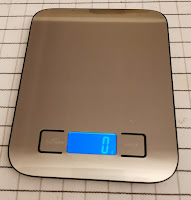How To Lose 30 Kilos in 16 Weeks
This post is a sort of TL;DR for the whole blog thus far - I'll dispense with most of the discussion. Some of this includes corrections from what I actually did with the benefit of hind-sight. I'll briefly note those parts.
Fundamental Rule: eat very low carbohydrate food. So cut out bread, rice, pasta, most fruit. Check the ingredients lists and avoid anything with a carbohydrate level above 10% by weight.
You should:
- Drink great amounts of water. An effect of the diet (part of ketosis) is to dehydrate rapidly. You must drink many litres of water per day.
- Add salt - a significant amount. Another ketosis effect.
- Take vitamin pills.
- Change your activity level. If you don't exercise much - don't suddenly start doing so in conjunction with the diet. You will lose weight more rapidly if you do add exercise - but will likely regain it afterwards. You can start extra exercise after the diet has concluded.
You'll lose weight very fast without additional exercise with this diet.
The Diet
1. Buy yourself a digital kitchen scale. Make sure its units are grams. You will use this for all food or liquid (other than water) that you consume. Bring it with you whenever you travel. It is indispensable. This one is from Adoric:
2. A simple calculator app on your phone
3. Every two days: 600 kcal first day and 1000 kcal for the second. (This is not what I did initially, but I recommend it now - see my post on the subject). Over the two days that's 800/day on average. This can be a single meal at 3pm, or two, the first at 12 noon, the second at 5pm (yes, this implies a long intermittent fast each day - see the post).
For the first few days it might take 10-15 minutes to properly determine the ingredients of each meal - but you'll get better at it. For each ingredient:
a. Check the label if it's in a packet - there will usually be an "Energy" or similar section showing for a 100g quantity both kJ (kilojoules) and kcal (kilocalories - what most people abbreviate to "calories"). It is that second figure you will use - kcal or calories. Note that there may be other quantities shown - it's the 100g one for calories you need.
If there's no label, go to Google and search "<name of food> calories 100g" - usually it will show you immediately the number of calories per 100g - the number you need. Make sure it is this number not "calories per serving" or similar.
b. Weigh the meal ingredient. Multiply the weight in grams by the calories per 100g from a. and divide by 100.
c. In your calculator app, enter 600 for a Day 1 or 1000 for a Day 2 and subtract and the results from b. Maintain this result, ready for the next meal if your have more than one per day.
d. Repeat a. - c. above until you run out of calories. Adjust the amounts as you go if you need a particular mix of ingredients. For the last ingredient, you can do it in reverse: check how many calories you have left and divide it by the calories per 100g for that ingredient - multiply by 100 for the number of grams you can have.
That's it. Keep going until you reach your weight target. But I'd better add some notes.
Notes
- You have to be completely rigorous in this process. For instance, if you've weighed your ingredients, you have your 600 calories worth (say) - but you want to fry them. You can't use oil! Not the tiniest amount. You will need to include the oil you will use as an ingredient in the steps above - and oil has the highest of all food energies - see my experiment on this!
- Be careful when Googling ingredients that you get the right ones. For example I ate some green beans at my in-laws place. Steamed or boiled green beans are 31 calories per 100g. But fried they are about 150 calories! Different types of cheese have widely varying energy levels - so don't just google "Cheese calories per 100g". And: peanuts are very high energy - but they are often sold with additional vegetable oil! The energy can be very significantly increased so that a small handful will entirely blow your day's diet.
Overall, remember this is a quite an extreme diet so that what appear to be small amounts of food can be very significant and could easily derail your effort. - No milk in tea or coffee - not even low fat. Drink only water (unless you calculate the energy and subtract it from your totals).
- No flavoured drinks - including 0% ones - there's usually a bit! Check in every case - on the label or look it up.
- No alcohol unless you subtract from your meal calorie levels.





Comments
Post a Comment